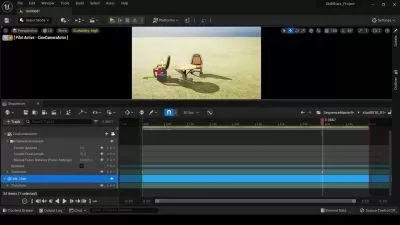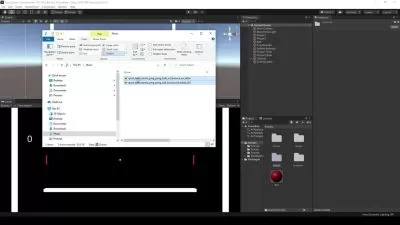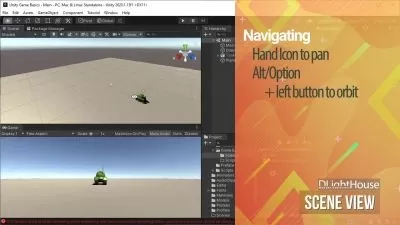Imagining Tomorrow’s Entertainment
Eric R. Williams
4:10:29
Description
In 1988, the TV series Star Trek introduced audiences to the holodeck. This fictional device used holograms to create fully immersive virtual worlds in which crew members on the starship U.S.S. Enterprise could roam freely and interact with the environment, objects, and characters as if in real life. Many of us have likely found ourselves wishing at some point that we, too, could enter the holodeck and go on these fantastical adventures. Guess what? That day may finally be here.
In Imagining Tomorrow's Entertainment, you will meet expert Eric R. Williams, Professor of New Media Storytelling and Emerging Technologies at Ohio University, where he heads up the cinematic virtual reality arm of the Game Research and Immersive Design (GRID) Lab. Eric will take you on a 10-episode tour beyond your wildest dreams and into the future of entertainment. Your mission during this journey will be to find out what is possible and probable in this rapidly approaching future. You will also have fun testing out these new technologies for yourself.
The world of entertainment is constantly changing and evolving. Today, we are no longer leaning back to consume our favorite stories. Instead, we are leaning forward and actively participating in their creation. This is XR, or Extended Reality, which is an umbrella term under which several other entertainment technologies reside, such as:
- Augmented Reality (AR),
- Virtual Reality (VR),
- Mixed Reality (MR), and
- Augmented Virtuality (AV).
XR also includes everything else in between these five terms. Think holograms, video games, and even 360-degree interactive movies. The landscape is shifting beneath our feet—and into our hands, heads, and bodies.
The Storyplex
As you prepare to leap into the future in Imagining Tomorrow's Entertainment, you will meet a handpicked selection of rising leaders in the field who will blow your mind with what is already out there. But to begin a big trip, you first need a roadmap to guide you, and Eric knows just where to get one. This roadmap is called “the Storyplex”—a new paradigm for storytelling where you will step out of the passive reality of classical realism and into an active reality called “collaborative realism,” where there is an interactive relationship between you and the story. The Storyplex concept, developed by Stephanie Riggs, author of The End of Storytelling, is a dynamic network of technology, narrative, and humanity.
The gateway drug to experiencing the Storyplex is 360-degree video, as this is how we can step outside of the framed content of our flat screens into a spherical space where the story appears to be happening all around us. You will get a taste of it here in this series.
Video Games and Esports
When discussing interactive entertainment, one of the biggest sectors to consider is video games. The video game industry is a 190-billion-dollar juggernaut, out-stripping both film and music in terms of revenue. Unlike the passive experience of television and film, games can offer agency and immersion and VR can engage a player's entire body, making video games a more active experience.
Today, video games have become more than home entertainment. The rise of “electronic sports,” known as esports, is a direct result of competitive online gaming and can now be seen as the evolution of traditional sports. This industry is rapidly growing and has become a global phenomenon. If you haven't heard of it, these numbers may convince you: Currently, 15 million active users watch 3 billion minutes of content each month.
It didn't start this way, but these professionals that are now esports athletes can now make the big bucks competing on the world stage—not unlike their traditional athlete counterparts in the NFL or the NBA. The only difference? This world stage is now digital, built upon a technological infrastructure to create the experience and an IT network critical for broadcasting, Twitch streaming, chats, Discord, and Twitter. Within the last decade, this industry has grown to where there are now whole professional careers built around it—including broadcasters, team managers, psychologists, trainers, and beyond.
In this new world, games are not limited to our living rooms. The playground is now global, and players can engage in real-time with anyone on the planet. This progression also has vast implications for human psychology and connection. Now, you can be together worldwide with friends, family, and even celebrities as if they’re beside you.
Enhancing Our Stories
Do you remember the Choose Your Own Adventure game book series from the '80s and '90s? What made those books so popular was that they gave their readers agency—the ability to control their fictional destinies. So interactive storytelling is not new, but it is changing as we move from interactive books and role-playing games like Dungeons & Dragons to the immersive technologies of the 21st century. The younger generation does not want to be told stories; they want to be part of stories. When you have agency over your entertainment, your scope and engagement in the story can be expanded.
One of the tools growing in popularity as we head in this direction is Cinematic Virtual Reality (Cine VR), which uses 360-degree cameras and full-sphere surround sound (ambisonic) microphones to capture sight and sound in a way that enhances your perception of reality both visually and aurally. Cine VR techniques are not only key in the entertainment industry; they can also serve as training tools for any number of specialized sectors, like training pilots and drivers.
When we blend the physical and digital, we get Augmented Reality (AR), which creates a bridge between worlds by using:
- Location,
- Objects,
- Proximity, and
- Motion Recognition.
Of all the technology we will explore in Imagining Tomorrow's Entertainment, AR has the greatest potential to immerse the audience in the story. It also has the greatest hurdles, however, as it is currently accessed with flat-screen devices, such as a phone. But it's only a matter of time before that could change, and there could be special glasses or other tools to experience AR. The key to AR's growth is the accessible and silly fun of games like Pokemon Go, which had an explosion in popularity after its release and is enjoyed by an unexpectedly wide demographic of players.
With the help of the Storyplex roadmap and Eric as your guide, you will take flight into Imagining Tomorrow's Entertainment. At the end of the journey, you will not only gain knowledge about the many kinds of exciting new technology already happening and developing currently, but you will also feel inspired to challenge yourself as a viewer, creator, and connoisseur. Now, you, too, can have the opportunity to help draw new road maps and reimagine the entertainment of tomorrow.
More details
User Reviews
Rating
Eric R. Williams
Instructor's CoursesEric R. Williams is a Professor in the School of Media Arts & Studies at Ohio University, where he teaches courses on screenwriting, film, and virtual reality production. He is also the director of the MFA in Communication Media Arts program at Ohio University. Professor Williams received his bachelor’s degree in Communication with a minor in Education from Northwestern University, and he earned his Master of Fine Arts degree in Film from Columbia University.
Before directing his first feature film, Professor Williams worked as a cinematographer and assistant director in New York City. He has written more than 30 screenplays. He has also written, produced, and directed for companies such as Workshop Productions, Liam Films, American Movie Classics, Fox Interactive, and Universal Studios.
Professor Williams’s films and screenplays have won the Best New Work award from the Writers Guild of America and the Individual Excellence Award in screenwriting from the Ohio Arts Council. His film Breaking News was selected as one of the “Top Five Films Not to Miss” by the Athens Independent Film Society at the Athens International Film and Video Festival. At Ohio University, he received the University Professor Award for excellence in teaching, and he was also a finalist for the Presidential Teacher Award.
Professor Williams co-edited the book Media and the Creative Process. He is also the author of two other books: Screen Adaptation: Beyond the Basics and The Screenwriters Taxonomy.
When he is not writing, producing, or directing, Professor Williams enjoys working on international media education projects and he frequently travels to South America and Eastern Europe. His dedication to teaching was recognized by the president of Guyana, where he was awarded a lifetime honorary membership to the CineGuyana society.

The Great Courses
View courses The Great Courses- language english
- Training sessions 11
- duration 4:10:29
- English subtitles has
- Release Date 2023/10/02

























